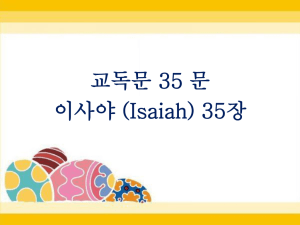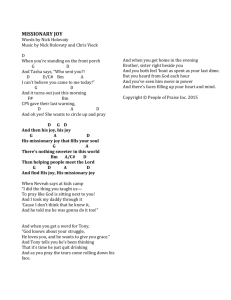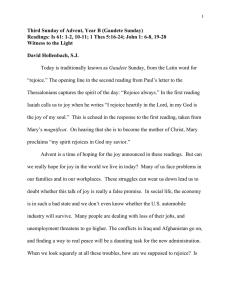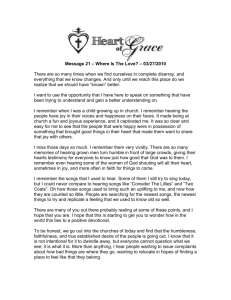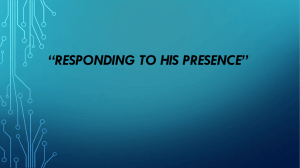Third Sunday of Advent, Year A (Gaudete Sunday)
advertisement
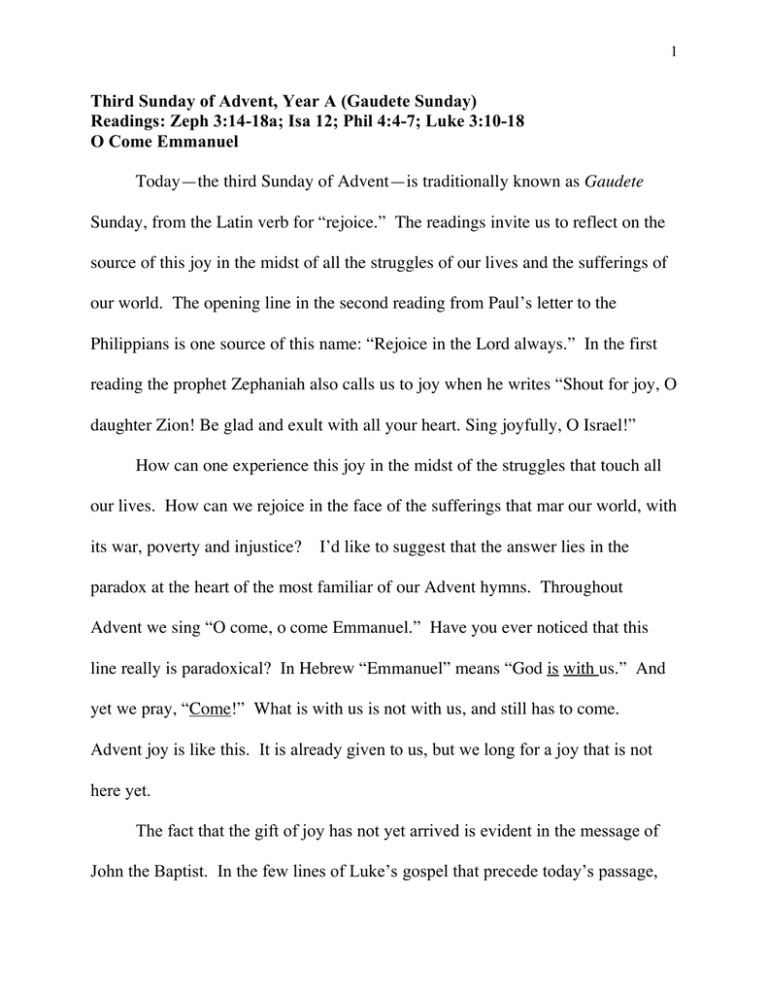
1 Third Sunday of Advent, Year A (Gaudete Sunday) Readings: Zeph 3:14-18a; Isa 12; Phil 4:4-7; Luke 3:10-18 O Come Emmanuel Today—the third Sunday of Advent—is traditionally known as Gaudete Sunday, from the Latin verb for “rejoice.” The readings invite us to reflect on the source of this joy in the midst of all the struggles of our lives and the sufferings of our world. The opening line in the second reading from Paul’s letter to the Philippians is one source of this name: “Rejoice in the Lord always.” In the first reading the prophet Zephaniah also calls us to joy when he writes “Shout for joy, O daughter Zion! Be glad and exult with all your heart. Sing joyfully, O Israel!” How can one experience this joy in the midst of the struggles that touch all our lives. How can we rejoice in the face of the sufferings that mar our world, with its war, poverty and injustice? I’d like to suggest that the answer lies in the paradox at the heart of the most familiar of our Advent hymns. Throughout Advent we sing “O come, o come Emmanuel.” Have you ever noticed that this line really is paradoxical? In Hebrew “Emmanuel” means “God is with us.” And yet we pray, “Come!” What is with us is not with us, and still has to come. Advent joy is like this. It is already given to us, but we long for a joy that is not here yet. The fact that the gift of joy has not yet arrived is evident in the message of John the Baptist. In the few lines of Luke’s gospel that precede today’s passage, 2 the Baptist has hard words for his listeners. He knows all about the way they mistreat each other unjustly. He calls them a “Brood of vipers” and asks “who warned you to flee from the coming wrath?” John proclaims that the messiah who is coming will separate the good wheat from the useless chaff. The useless chaff will be burned it up with unquenchable fire. Not a joy-inspiring message. John the Baptist surely knew about the obstacles to joy in his world and ours. Can we rejoice when illness threatens us or someone dear to us, or while the conflicts in Iraq and Darfur seem to spin out of control? Zephaniah knew about realities like these also, for he wrote our first reading at a time when the people of Israel were burdened with war and destruction. Their lives were being assaulted and their hopes dashed. Nevertheless, he calls them to “Shout for joy... Sing joyfully.... Be glad and exult.” How can they possibly respond in this way? Twice Zephaniah tells them: God is with you. Zephaniah proclaims the reality of Emmanuel—God is with you here and now. God can be the source of your joy, even though you may be tempted to depression and despair by the destruction war has brought to you. Because of God’s loving presence, you have nothing further to fear. You can move forward into a new, fuller, genuinely joyful life. God’s love is at work within you and within the world, bringing the peace you so desperately seek. This is the source of the joy we are invited to. 3 The paradox of the Advent hymn is that this love of God is with us but injustices and illnesses and wars are with us too. God’s presence is the source of our joy, but the continuing reality of injustice means our joy is not yet complete. Will this incompleteness dash our hopes and make us skeptical that real joy is possible at all? This would not be the way of Jesus. We know that Jesus was very aware of the suffering and injustice in his world. His response was to heal the sick, giving sight to the blind and the lame. He brought forgiveness to sinners like prostitutes and the tax collectors who collaborated with the oppressive Roman Empire. Indeed he invited these sinners to share his dinner table with him—so much so that he was called “a glutton and a drunkard, a friend of tax collectors and sinners.” The God who is with us—Emmanuel—is a God who is in the very midst of the brokenness, injustice, and sinfulness of our world. God is at work at the heart of the messy scene of our lives, not somewhere else where everything is perfectly healthy, peaceful, and just. Christian joy, then, does not have to wait until the messiness is gone or even all the sinfulness removed. We can rejoice now, here, for Emmanuel is with us, here, now. We can also have the confidence to pray that God’s love will become more visible, healing all wounds and overcoming all injustices. We can have the faith to say Come Emmanuel—come more fully among us, till every tear is wiped way and joy is complete. Let us make that 4 prayer together at Christ’s table now, where we imperfect people are invited to rejoice. David Hollenbach, S.J. 2006 St. Ignatius Church December 17,
